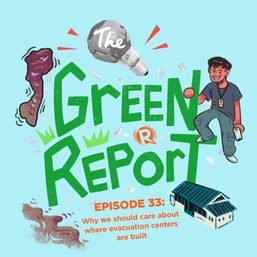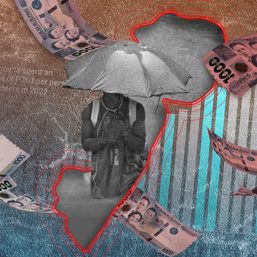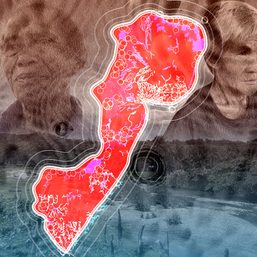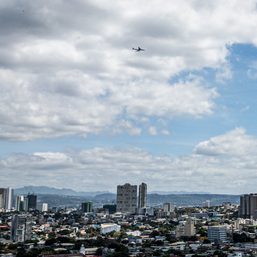SUMMARY
This is AI generated summarization, which may have errors. For context, always refer to the full article.
![[OPINION] When will we learn to address climate change?](https://www.rappler.com/tachyon/2020/11/climate-change-640.jpg)
It was not a matter of if, but when Metro Manila would be hit by another Ondoy. It took 11 years before the familiar images of people stranded on roofs, of entire villages flooded, and of debris flying in the air were again observed in the National Capital Region, this time due to the onslaught of Ulysses.
Within just 3 weeks, the Philippines experienced the wrath of 5 storms, including Goni, the strongest typhoon recorded this year. They have repeatedly battered communities with strong winds and heavy rainfall, often before people could even recover from the previous storm, not to mention the effects of the COVID-19 pandemic.
When even Marikina City and Albay, two of the model areas for disaster risk reduction management, are overwhelmed by these events, it is fair to ask: has the current leadership actually learned from the failures of Ondoy, Yolanda, and other disasters?
Not enough attention
While improvements have been observed in certain aspects of climate and disaster governance, our experiences with recent storms have shown that our leaders have not paid enough attention to addressing climate change. Instead, the same old problems continue to hurt our calls for action: unnecessary politics, delays in implementation of relevant policies and programs, and the glorification of resilience.
There has never been a better example of why the traditional notion of resilience to climate-related disasters is no longer enough for the Philippines to address this crisis. Recovering from losses and damages inflicted by extreme weather events will become futile if the hazards become too strong, if the reactive culture is not removed in favor of a preventive one.
The recent barrage of storms is only a taste of what could still come. All the impacts we have experienced in the past decade alone have occurred in a world warmer by around one degree Celsius. Without drastically reducing pollution, we will surpass 1.5 degrees Celsius within the decade, which is regarded as a point where climate change impacts may become irreversible. Imagine how destructive natural hazards will be in a 2 or 3-degree warmer world, which is where we are headed under business-as-usual scenarios.
Typhoons are not the only climate-related hazard that inflicts significant economic loss and damage to the Philippines. Per the 2019 Asia-Pacific Disaster Report, agricultural droughts cause more than $5.5 billion worth of economic losses every year, which is slightly lower than the effect of typhoons. This shows that the impacts of slow onset events such as droughts should be addressed as urgently and effectively as rapid onset hazards like storms.
The economic lockdowns caused by the pandemic is projected to lead to a 6% drop in greenhouse (GHG) emissions this year. Yet this is still not enough for us to avoid exceeding the 1.5-degree limit. This shows how badly the world needs to change to resolve the climate crisis.
More than just disasters
Always remember that climate change is more than just about disasters. Adapting to stronger typhoons, more intense droughts, sea level rise, and other manifestations of climate change, which are closely linked to disaster risk reduction, is only half of the equation. The other half deals with mitigating GHG emissions, through both preventing more emissions from burning fossil fuels and removing GHG already in the atmosphere and oceans.
With the global nature of the crisis, no country can address the climate emergency on its own. This is why the Philippines must confirm its commitment to climate action by submitting before the end of 2020 its self-determined Nationally Determined Contributions towards the fulfilment of the goals of the Paris Agreement.
This NDC, whose submission has been repeatedly delayed, should contain a decarbonization pathway with quantifiable economy-wide targets for avoiding and reducing greenhouse gas emissions, and concrete actions for climate change adaptation and mitigation. It is also needed for our country to access means of implementation such as financial and technological aid and capacity-building, which are needed to successfully implement climate change adaptation and mitigation programs.
Centralizing disaster response makes no sense for a highly vulnerable, archipelagic country like the Philippines. Instead, efforts to reduce risks to climate change and strengthening local capacities to deal with potential impacts must be prioritized by the national government, a sentiment that several senators have recently stated.
Recent events have also shown that investments in climate-proof infrastructure in the agriculture, waste, industry, transport, and renewable energy sectors need to be scaled up. Doing so also provides co-benefits to health, social services, and local incomes that helps resolve other issues, especially reducing poverty and inequalities.
Higher budget allocations must also be provided for agencies responsible for mainstreaming and addressing climate change. Strengthening risk-informed early warning and impact-based forecasting systems are key to saving lives and minimizing loss and damage for a country projected to be hit by more extreme climate-related events.
Educating Filipinos about the climate crisis and its solutions has never been more important. A Harvard survey revealed that nearly 60% of Filipinos have a low level of knowledge on climate change, with regions that are hardest-hit by recent storms such as Bicol and Calabarzon being among those with the lowest awareness. Without knowledge and capacity-building at the local level, effective climate action is impossible. It is also time that major media outlets report on more climate change issues instead of only focusing on it when disasters occur.
Truth be told, these are basically the same calls climate advocates have made for more than a decade. Leaders have come and go, but recent events have shown that not enough has changed for the better.
Until our leaders recognize that quick fixes will not resolve a long-term, complex issue like climate change, expect the same old story to happen. Enough is enough, and it’s time for a change against climate change.
Do we have your attention now? – Rappler.com
John Leo is the Program Manager of Living Laudato Si’ Philippines and a member of the interim Secretariat of Aksyon Klima Pilipinas. He has been a citizen journalist since 2016.
Add a comment
How does this make you feel?
![[OPINION] Higher ambitions in avoiding emissions: The Philippines’ climate pledge](https://www.rappler.com/tachyon/2020/10/imho-ph-ghg-emissions.jpg?fit=449%2C449)





There are no comments yet. Add your comment to start the conversation.